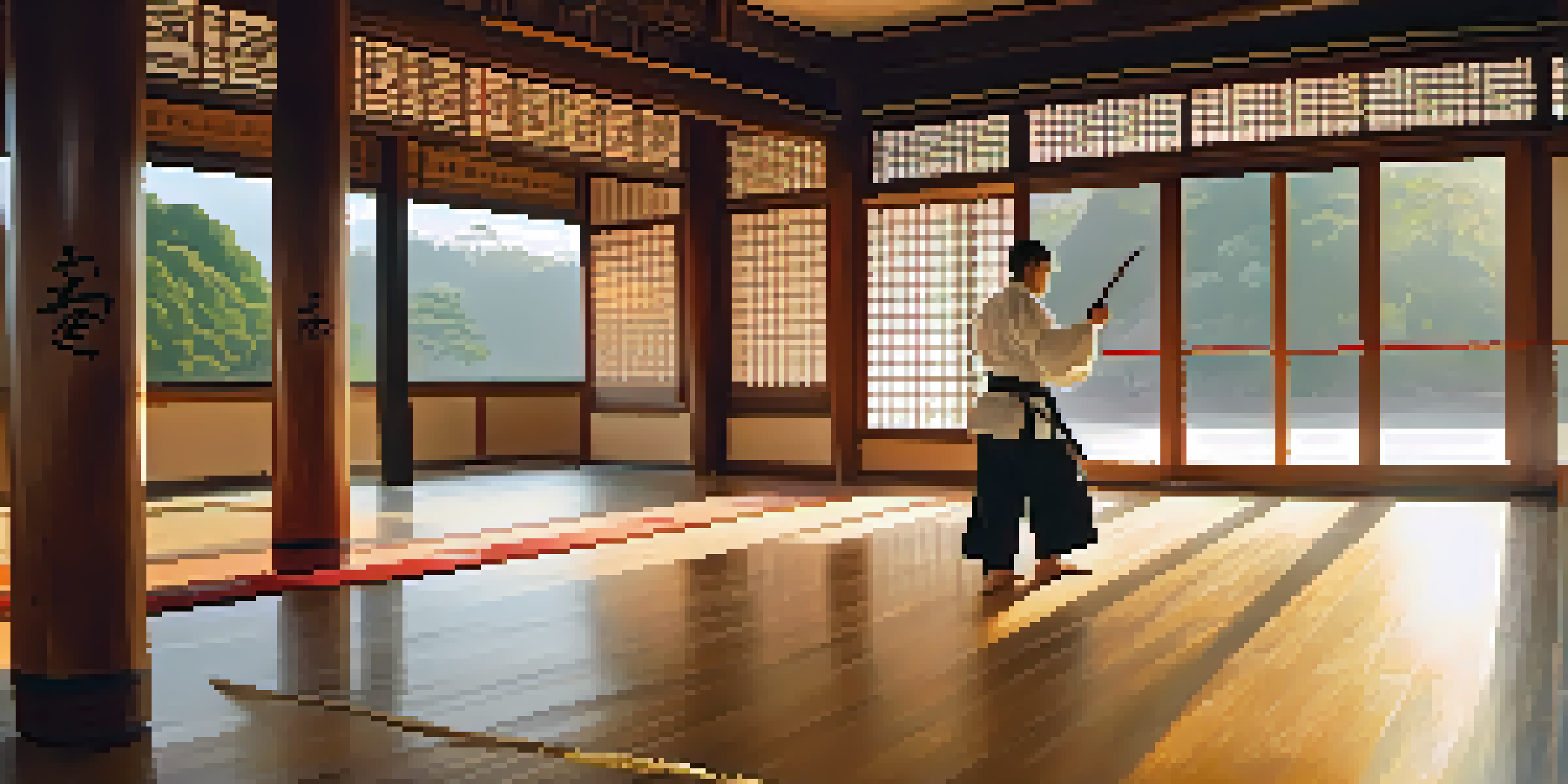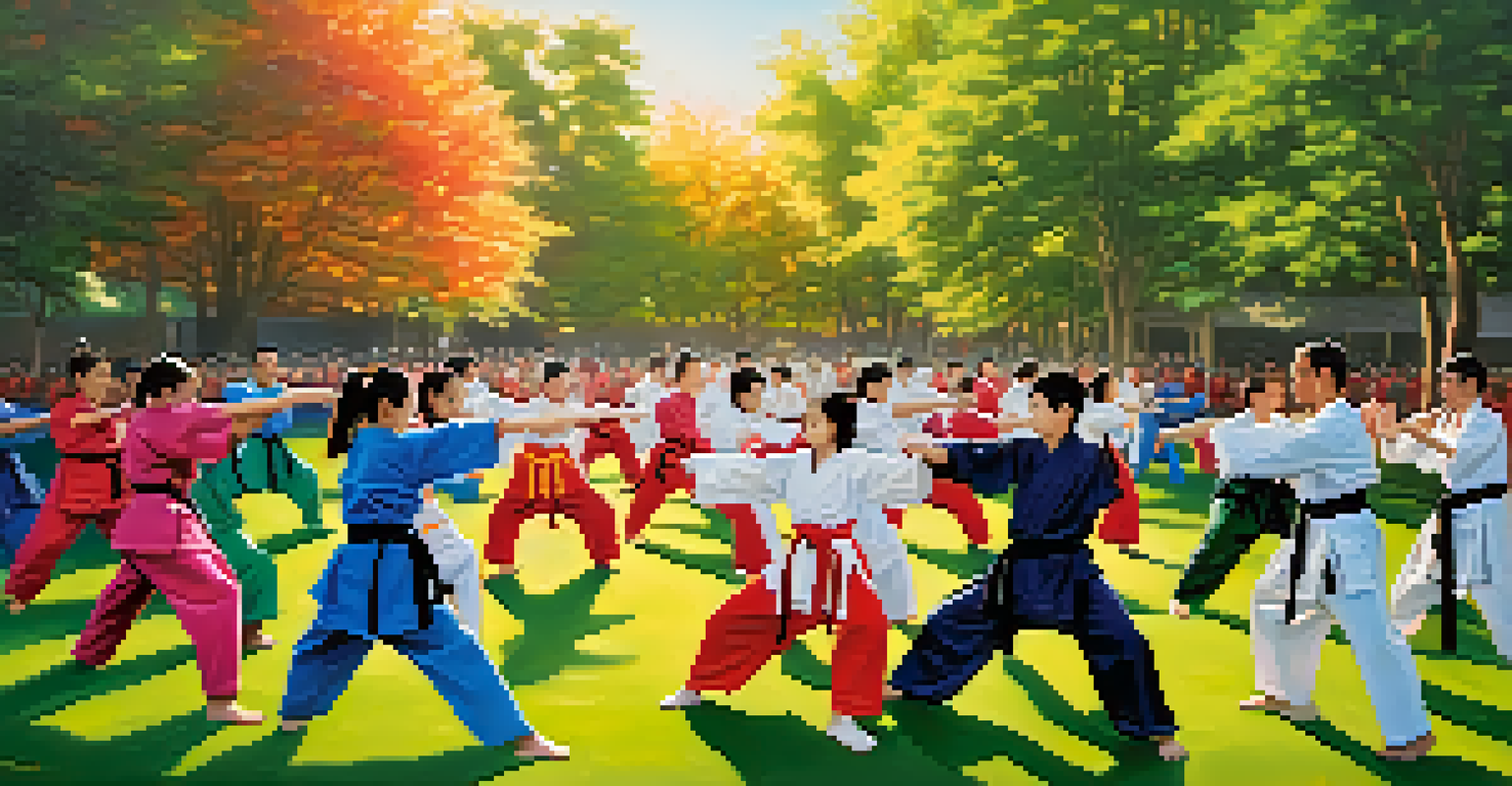Martial Arts: A Global Phenomenon Shaping Cultures Worldwide

The Roots of Martial Arts: A Cultural Journey
Martial arts have deep historical roots, tracing back thousands of years across various cultures. From the ancient Chinese practices of Kung Fu to the disciplined forms of Japanese Judo, each style reflects the values and philosophies of its origin. These disciplines not only teach self-defense but also embody a way of life, emphasizing respect, discipline, and perseverance.
The ultimate aim of martial arts is not having to use them.
As these arts spread globally, they adapted and evolved, creating unique blends that resonate with local cultures. For instance, Brazilian Jiu-Jitsu emerged from Japanese Jujutsu but adapted to include ground fighting techniques, making it a favored choice among practitioners today. This evolution showcases how martial arts can transcend borders and foster intercultural exchange.
Ultimately, the rich history of martial arts serves as a testament to human creativity and the universal desire for self-improvement and mastery. Understanding these origins helps us appreciate the significance of martial arts in shaping not just individuals, but entire communities.
Martial Arts as a Tool for Personal Development
Engaging in martial arts can be a transformative journey for many individuals. Through rigorous training and discipline, practitioners often find themselves developing not just physical strength but also mental resilience. This dual development is key; martial arts instill a sense of confidence and self-awareness that extends beyond the dojo.

Many martial arts schools emphasize the importance of setting personal goals, whether it's mastering a new technique or achieving a higher belt rank. This focus on personal achievement encourages practitioners to push their limits, fostering a growth mindset. For instance, a student might start with basic moves but gradually grow into a skilled fighter, showcasing the journey of dedication and hard work.
Martial Arts Promote Personal Growth
Engaging in martial arts fosters physical strength, mental resilience, and a supportive community that encourages personal development.
Moreover, the camaraderie formed in martial arts classes can create a supportive community. Practitioners often bond over shared challenges and victories, further enhancing their journey of personal growth. Such connections are invaluable, as they remind us that we are not alone in our pursuits.
The Role of Martial Arts in Modern Society
In today's fast-paced world, martial arts offer a sanctuary for many seeking balance and focus. With the stresses of daily life, training can provide a much-needed outlet for physical activity and mental clarity. This is particularly relevant as more people turn to these practices for stress relief and holistic well-being.
Martial arts are ultimately self-improvement, self-discovery, and self-knowledge.
Moreover, martial arts have found their way into schools and community centers as effective programs for youth development. These programs often teach self-discipline, respect, and conflict resolution, equipping young individuals with essential life skills. By integrating martial arts into educational settings, communities can foster a generation that values respect and discipline.
Importantly, martial arts also promote physical fitness, which is increasingly vital in an age where sedentary lifestyles prevail. With structured training routines, practitioners improve their strength, flexibility, and cardiovascular health, contributing to their overall well-being. This multifaceted approach makes martial arts not just a sport, but a lifestyle choice.
Martial Arts and Mental Health Benefits
The mental health benefits of martial arts are profound and well-documented. Many practitioners report reduced anxiety and improved mood due to the physical activity and mindfulness practices involved. Engaging in martial arts can create a state of flow, where individuals focus entirely on the moment, providing a break from everyday worries.
Additionally, martial arts training often includes meditation and breathing exercises, which can further enhance mental clarity and emotional regulation. Techniques such as these encourage practitioners to develop a deeper connection with their own thoughts and feelings, promoting self-awareness and emotional intelligence. As a result, many find martial arts to be a therapeutic outlet.
Cultural Exchange Through Training
Martial arts serve as a bridge for cultural exchange, uniting practitioners from diverse backgrounds and promoting mutual understanding.
Furthermore, the discipline learned in martial arts can translate to better coping strategies in daily life. As practitioners face challenges on the mat, they learn resilience and perseverance, skills that are invaluable when navigating life's ups and downs. This holistic approach to mental health makes martial arts a powerful ally in personal well-being.
Cultural Exchange Through Martial Arts
Martial arts serve as a bridge for cultural exchange, breaking down barriers and fostering understanding. As practitioners from diverse backgrounds come together, they share not only techniques but also traditions and philosophies. This exchange enriches the experience for everyone involved, creating a melting pot of ideas and practices.
For example, the global popularity of mixed martial arts (MMA) has brought together techniques from various disciplines, including Muay Thai, Brazilian Jiu-Jitsu, and wrestling. This fusion showcases how martial arts can evolve and adapt, reflecting the diverse influences of different cultures. Such events also highlight the respect among practitioners, regardless of their backgrounds.
The cultural impact of martial arts can also be seen in film and media, where martial arts legends like Bruce Lee and Jackie Chan have become global icons. Their influence has inspired countless individuals to explore martial arts, further promoting cultural exchange and appreciation. Ultimately, martial arts exemplify how shared passions can unite people across the globe.
Martial Arts in Popular Media and Its Influence
The portrayal of martial arts in popular media has significantly influenced its perception and practice worldwide. Films, television shows, and online platforms have showcased martial arts in ways that captivate audiences, often highlighting the extraordinary skills of practitioners. This representation can spark interest and encourage individuals to explore martial arts in real life.
However, while popular media often romanticizes martial arts, it's essential to understand the discipline and dedication required to attain such skills. Movies can depict flashy moves and unrealistic scenarios, but the reality involves years of hard work and commitment. This distinction is crucial for newcomers who may be drawn to the spectacle rather than the practice's true essence.
Future Trends in Martial Arts
The integration of technology and holistic wellness into martial arts training is making it more accessible and relevant in today's society.
Additionally, the influence of martial arts in media can also promote cultural awareness and appreciation. By showcasing different styles from around the world, audiences gain insight into various cultures and their histories. This understanding can lead to greater respect and curiosity about martial arts, making it a powerful tool for cultural education.
The Future of Martial Arts: Trends and Innovations
As we look to the future, martial arts continue to adapt to changing societal needs and technological advancements. For instance, the rise of online training platforms has made martial arts more accessible than ever before. This shift allows individuals to learn from experienced instructors globally, breaking geographical barriers.
Moreover, there is a growing trend towards incorporating fitness and wellness into martial arts training. Many schools now offer holistic programs that blend traditional techniques with modern fitness regimens. This fusion not only attracts a broader audience but also emphasizes the importance of physical health in martial arts practice.

Finally, as more people recognize the mental and emotional benefits of martial arts, we can expect to see an increase in its integration into wellness programs. Organizations and communities may adopt martial arts as a means of promoting mental health, resilience, and personal growth. This future-focused approach highlights the enduring relevance of martial arts in our ever-evolving world.